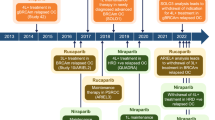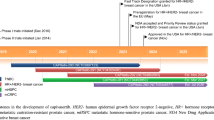Summary
Renal cell carcinoma exhibits chemoresistance attributable in part to the P-glycoprotein drug efflux mechanism. Acrivastine is a hydrophylic antihistamine that has been shownin vitro to reverse this form of resistance. After five patients were treated on a dose-finding study, seventeen patients with metastatic or unresectable renal cell carcinoma were entered into a phase II study of vinblastine in combination with acrivastine. Patients received oral acrivastine at doses of 400 mg every 4 hours for 6 days and a 96-hour continuous infusion of vinblastine at a dose of 1.6 mg/m2/24 h. Of 15 evaluable patients, no tumor responses were seen. The regimen was well-tolerated with the majority of toxicities being gastrointestinal and hematologic. Serum levels of acrivastine, its principal metabolite (270C81) and vinblastine were measured during the study. Based onin vitro data, the plasma levels of acrivastine were within a range adequate to block P-glycoprotein activity. High doses of acrivastine were well-tolerated clinically, however, the combination of acrivastine and vinblastine was not active against renal cell carcinoma.
Similar content being viewed by others
References
Fojo AT, Shen DW, Mickley LA, Pastan I, Gottesman MM: Intrinsic drug resistance in human kidney cancer is associated with expression of a human multi-drug resistance gene. J Clin Oncol 5:1922–1927, 1987
Mickisch GH, Roehrich K, Koessig J, Forster S, Tschada RK, Alken PM: Mechanisms and modulation of multidrug resistance in primary human renal cell carcinoma. J Urol 144:755–759, 1990
Mickisch GH, Koessig J, Tschada RK, Keilhauer G, Schlick E, Alken PM: Circumvention of multidrug resistance mediated by P-170 glycoprotein using calcium antagonist in primary human renal cell carcinoma. Urol Int 47:118–125, 1991
Ford JM, Hait WN: Pharmacology of drugs that alter multidrug resistance in cancer. Pharmacol Rev 42:155–199, 1990
Miller TP, Grogan TM, Dalton WS, Spier LM, Scheper RJ, Salmon SE: P-Glycoprotein expression in malignant lymphoma and reversal of clinical drug resistance with chemotherapy plus high-dose verapamil. J Clin Oncol 9:17–24, 1991
Cairo MS, Siegel S, Anas N, Sender L: Clinical trial of continuous infusion verapamil, bolus vinblastine, and continuous infusion VP-16 in drug resistant pediatrie tumors. Cancer Res 49:1063–1066, 1989
Miller RL, Bukowski RM, Budd GT, Purvis J, Weick JK, Shepard K, Midha KK, Ganapathi K: Clinical modulation of doxorubicin resistance by the calmodulin-inhibitor trifluoperazine: A phase I/II trial. J Clin Oncol 6:880–888, 1988
Yahanda AM, Adler KM, Fisher GA, Brophy NA, Halseg RI, Gosland MP, Lum BL, Sikic DI: Phase I trial of etoposide with cyclosporine as a modulator of multidrug resistance. J Clin Oncol 10:1624–1634, 1992
Lum BL, Kaubisch S, Yahanda AM, Adler KM, Jew L, Ehsan MN, Brophy NA, Halsey J, Gosland MP, Sikic BI: Alteration of etoposide pharmacokinetics and pharma-codynamics by cyclosporine in a phase I trial to modulate multidrug resistance. J Clin Oncol 10:1635–1642, 1992
King AC: Proceedings of the First International Annual Pezcoller Symposium. In: Mihich E (ed) Drug Resistance: Mechanism and Reversal, pp. 203–207. John Libbey CIC, Rome, Italy, 1990
Hrushesky WJ, Murphy GP: Current status of the therapy of advanced renal cell carcinoma. J Surg Oncol 9:277–288, 1977
DeKernion JB: Treatment of advanced renal cell carcinoma — traditional methods and innovative approaches. J Urol 130:2–7, 1983
Chang SY, Nelson FR, Findlay JWA, Taylor LCE: Quantitative gas chromatographic-mass spectrometric analysis of acrivastine and a metabolite in human plasma. J Chrom 497:288–295, 1989
Vendrig DEMM, Holthuis JJM: Solid-phase extraction of vinblastine and vincristine from plasma and urine: Variable drug recoveries due to non-reproducible column packings. J Chrom 414:91–100, 1987
Vendrig DEMM, Teeuwsen J, Holthuis JJM: Analysis of vinca alkaloids in plasma and urine using high-perform-zance liquid chromatography with electrochemical detection. J Chrom 424:83–94, 1988
Bender RA, Hamel E, Hande KR: Plant alkaloids. In: Chabner BA, Collins JM (eds) Cancer Chemotherapy, pp. 253–275. Lippincott, Philadelphia PA, 1990
Ratain MJ, Vogelzang NJ: Phase I and pharmacological study of vinblastine by prolonged continuous infusion. Cancer Res 46:4827–4830, 1986
Author information
Authors and Affiliations
Rights and permissions
About this article
Cite this article
Berlin, J., King, A.C., Tutsch, K. et al. A phase II study of vinblastine in combination with acrivastine in patients with advanced renal cell carcinoma. Invest New Drugs 12, 137–141 (1994). https://doi.org/10.1007/BF00874444
Issue Date:
DOI: https://doi.org/10.1007/BF00874444




